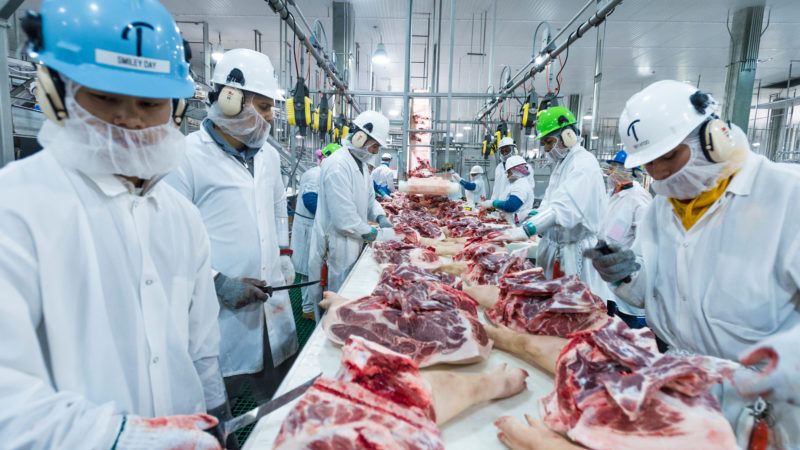House Judiciary Committee Members Ask USDA To Empower Small Ranchers and Meat Processors
Anti-competitive regulations have made Americans far too reliant on mega meat processors. It's time to level the playing field.

Six Republican members of the House Judiciary Committee have asked Secretary of Agriculture Sonny Purdue to relax U.S. Department of Agriculture (USDA) enforcement of some meat inspection rules due to the COVID-19 pandemic, which has sickened and killed employees and USDA inspectors who work inside some of the largest U.S. meat processing plants.
In a letter last week, ranking member Rep. Jim Jordan (R–Ohio) and Reps. James Sensenbrenner (R–Wisc.), Ken Buck (R–Colo.), Matt Gaetz (R–Fla.), Kelly Armstrong (R–N.D.), and Gregory Steube (R–Fla.), ask Purdue to "revisit burdensome regulations that create barriers to entry and lessen competition in the nation's meat processing industry." It asks Purdue to take steps to bolster small ranchers and farmers and improve the resiliency of the meat supply by creating a more just playing field for small producers.
As Progressive Farmer reports, the letter asks the agency to allow smaller facilities flexibility with their HACCP plans, which are intended to establish a proactive approach to preventing foodborne illness but which often skew in favor of larger producers. The letter also asks the agency to facilitate interstate shipments of meat from state-inspected facilities, cover inspector overtime payments, and streamline some labeling rules. I'm pleased and honored to report that around 20 percent of the citations in the letter reference my own writings here and elsewhere.
The lawmakers' appeal to Purdue comes at an extraordinary time for America's food system. Many of the nation's largest meat processors have been crippled by COVID-19 outbreaks in their plants. Because of massive industry consolidation, Americans get most of our meat from just a few sources.
"There are more than 800 federally inspected slaughterhouses in the United States, according to recent USDA data," I write in my 2016 book Biting the Hands that Feed Us. "The thirteen largest U.S. cattle slaughterhouses account for 56 percent of all cattle killed in this country. The figures are similar for hogs (twelve plants account for 57 percent of all slaughters) and other livestock."
Many of these big plants have been forced to close temporarily or to curtail operations, leading to supply shortages. (This week, a USA Today report, part of an ongoing investigation into meat processing by the paper, raised questions about whether the domestic meat supply was ever in jeopardy of failing to keep up with demand during the pandemic.)
Adding to the pressure on the meat industry, the Trump administration has launched an investigation into allegations of monopolistic practices by those same large processors. In March, even before the pandemic ripped through U.S. meat plants, several Members of Congress wrote to Purdue asking him to amend a proposed rule intended to address "unreasonable, retaliatory, and predatory practices within the [meatpacking] industry." While the government investigates allegations of price-fixing and other potential antitrust violations by the nation's largest meat processors, a proposed class-action lawsuit filed last week in federal court in Minneapolis has lobbed similar claims against those and other parties.
Though it's far too early to be sure, it's not unreasonable to predict the federal investigation, Minnesota lawsuit, calls by some politicians to break up big meat processors, ongoing economic distress and uncertainty, or some combination of these factors could further limit the capacity of the largest processors in the years to come.
That drives home the importance of this month's letter to Purdue. We've seen what happens when the largest processors can't operate at capacity. Our laws and regulations should anticipate similar challenges in the future and embrace rules that strengthen smaller producers and let them grow to meet demand.
Still, though the letter is welcome, even if the USDA were to adopt its recommendations, there are several other concrete steps the agency—or Congress—could take to create real and lasting change in the way meat is regulated and sold in this country. Chief among those needed reforms is the PRIME Act, which would return to the states the power to regulate meat processing and sales within their borders, a power over intrastate commerce they've not had since—as I explained here—Congress wrested it away unconstitutionally more than 50 years ago.
Given the challenges the meat industry has faced over the past several months, the need to improve the way meat processors of all sizes are regulated is more obvious and more important than at any point in our lifetimes. The GOP House Judiciary Committee letter to USDA Purdue is just the latest data point to drive home that fact.


Show Comments (57)